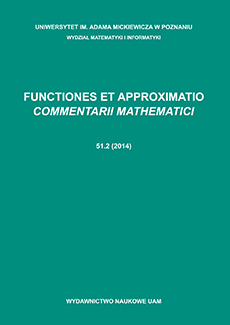Abstract
Let $m_1$, $m_2$, and $m_3$ be distinct square-free integers (including $1$). First, we show that there exist infinitely many square-free integers $d$ with $\gcd(m_1m_2, d) = 1$ such that the class numbers of $\mathbb{Q}(\sqrt{m_1d})$ and $\mathbb{Q}(\sqrt{m_2d})$ are both divisible by $3$. This is a generalization of a result of T.~Komatsu [15]. Secondly, we show that there exist infinitely many positive fundamental discriminants $D$ with $\gcd(m_1m_2m_3, D) = 1$ such that the class numbers of real quadratic fields $\mathbb{Q}(\sqrt{m_1D})$, $\mathbb{Q}(\sqrt{m_2D})$, and $\mathbb{Q}(\sqrt{m_3D})$ are all indivisible by $3$ when $m_1$, $m_2$, and $m_3$ are positive. This is a generalization of a result of D.~Byeon [4]. We add an application of this result to the Iwasawa invariants related to Greenberg's conjecture.
Citation
Akiko Ito. "Existence of an infinite family of pairs of quadratic fields $\mathbb{Q}(\sqrt{m_1D})$ and $\mathbb{Q}(\sqrt{m_2D})$ whose class numbers are both divisible by $3$ or both indivisible by $3$." Funct. Approx. Comment. Math. 49 (1) 111 - 135, September 2013. https://doi.org/10.7169/facm/2013.49.1.8
Information





